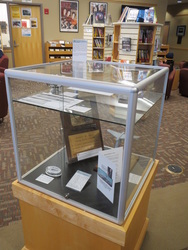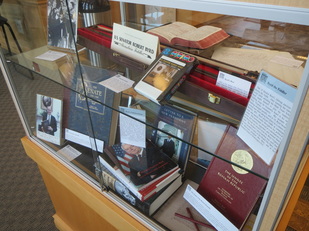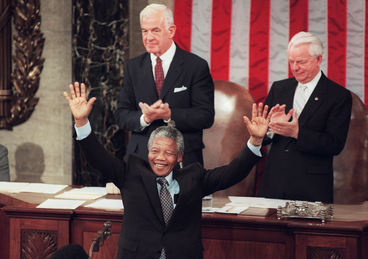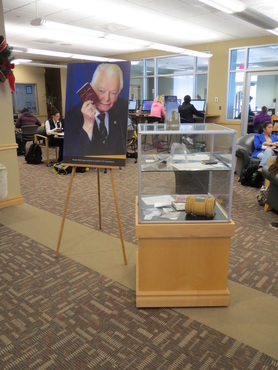|
Note: This post was previously listed under our "News from the Grey Box" blog series The Ruth Scarborough Library at Shepherd University is hosting an exhibit of objects from the Senator Robert C. Byrd collection. The Director of Archives, Marc Levitt, his assistant Jody Brumage, and the rest of the staff and interns at the Byrd Center collaborated on the object selection and overall exhibit design. Three exhibit cases highlight important aspects of Byrd’s life and career, featuring his senatorial leadership, appropriations to the state of West Virginia, and his creative nature as a scholar and a musician.  The Appropriations Case The Appropriations Case In the lobby of the library, visitors will see two cases. One includes objects from Byrd’s many positions of leadership in the Senate. An assortment of documents, photographs, and objects highlight Byrd’s ascension to these positions and his role in some of the key decisions made during his tenure. A second case includes objects relative illustrative of Senator Byrd’s appropriations to West Virginia. Some of these projects related to transportation and defense, while others enhanced the state’s educational and recreational institutions. On the national level, Byrd was widely recognized for his leadership on the Senate Appropriations Committee, and over his career he appropriated approximately $10 billion dollars to projects throughout the state.  Byrd’s Creative Works Case Byrd’s Creative Works Case The largest display is found in the reading room of the library, and includes various objects ranging from childhood drawings and a painting, to research notes and Byrd’s published books. Visitors can see the creative side of Robert Byrd, including products of his dedication to the study of history and his great talents as an accomplished country fiddler. The Byrd Center invites you to take this opportunity to view a unique sampling of the hundreds of objects contained in the collections of our archive. For general questions about the exhibit or a tour of the Center, feel free to contact any of the Byrd Center staff. If you find any of these documents, photographs, or objects particularly interesting and would like to schedule a follow-up research appointment in the archive, please contact Jody. We thank the Ruth Scarborough Library for accommodating the exhibit, which will run through January 24, 2014. For hours, please visit the Scarborough Library website. By Ray Smock  Speaker Tom Foley and Senate President Pro Tempore Robert C. Byrd with Nelson Mandela, June 26, 1990. (Photo by Kevin Larkin/AFP/Getty Images) Speaker Tom Foley and Senate President Pro Tempore Robert C. Byrd with Nelson Mandela, June 26, 1990. (Photo by Kevin Larkin/AFP/Getty Images) I never met Nelson Mandela, but I did see him shortly after he was released from his long prison term, when he spoke before a joint meeting of Congress on June 26, 1990. His passing sent me back to the journal I kept during my years as Historian of the House of Representatives to reflect on my eyewitness account of his speech before Congress. It was my good fortune to witness many great and historical moments on the floor of the House chamber. This one ranks in a category of its own. When Mandela was released from prison after 27 years behind bars for being a threat to the South African government, he was the most famous prisoner in the world and a moral force of great dimension, even from his cell. At the time of his release it was not clear if South Africa was headed toward mass violence and civil war, or if freeing Mandela would be the beginning of the end of the apartheid system of racial segregation where a white minority ruled a black majority. We know now that Mandela would lead his country toward reconciliation, not war, and that he would be elected president of South Africa in 1994. But when he appeared before Congress in 1990, none of us knew for sure how he would finally shape world history and the history of his nation. Note: This post was previously listed under our "News from the Grey Box" blog series Part 2 of a 4 Part Series
By Malorie Matos Senator Robert C. Byrd’s political career was a long and substantial one, spanning over 60 years, but the late senator’s impressive career may have never begun at all had it not been for an unlikely political tool: his fiddle. When 29 year-old Robert Byrd first considered a run for the West Virginia House of Delegates in 1946, his chances at victory seemed highly unlikely. Byrd was not an established politician, nor did he have any money or political connections. He was simply a small-town butcher from a poor coal-mining family with no way of effectively gaining support. It was not until an acquaintance of Byrd’s suggested he play his fiddle at rallies that his luck began to change. |
Welcome to the Byrd Center Blog! We share content here including research from our archival collections, articles from our director, and information on upcoming events.
Categories
All
Archives
July 2023
|
Our Mission: |
The Byrd Center advances representative democracy by promoting a better understanding of the United States Congress and the Constitution through programs and research that engage citizens.
|
Copyright © Robert C. Byrd Center for Congressional History and Education
|


 RSS Feed
RSS Feed
